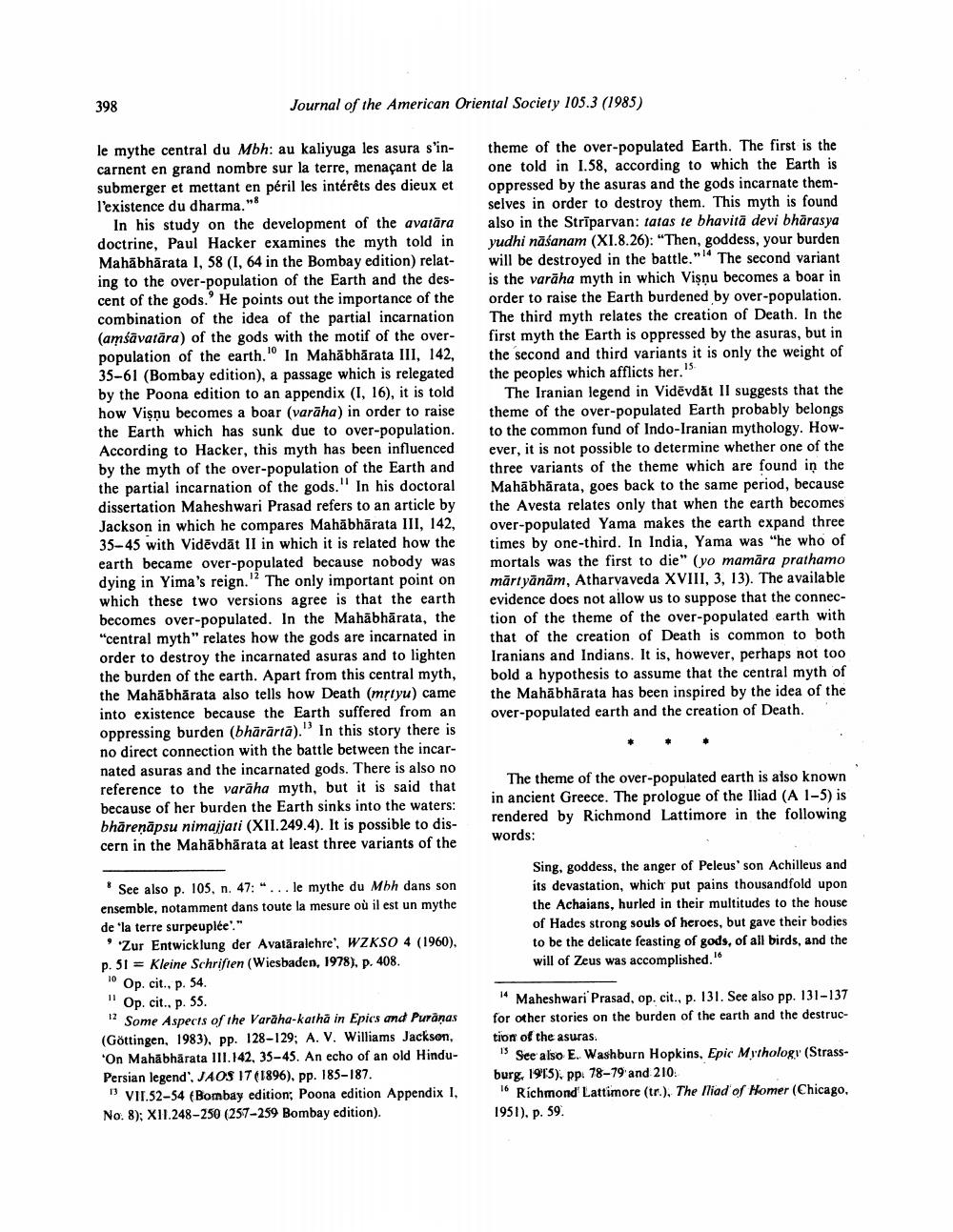Book Title: Over Burdened Earth In India And Greece Author(s): J W De Jong Publisher: J W De Jong View full book textPage 2
________________ 398 Journal of the American Oriental Society 105.3 (1985) le mythe central du Mbh: au kaliyuga les asura s'incarnent en grand nombre sur la terre, menaçant de la submerger et mettant en péril les intérêts des dieux et l'existence du dharma." In his study on the development of the avatara doctrine, Paul Hacker examines the myth told in Mahabharata 1, 58 (1, 64 in the Bombay edition) relating to the over-population of the Earth and the descent of the gods." He points out the importance of the combination of the idea of the partial incarnation (amsävatāra) of the gods with the motif of the overpopulation of the earth.10 In Mahabharata III, 142, 35-61 (Bombay edition), a passage which is relegated by the Poona edition to an appendix (I, 16), it is told how Visņu becomes a boar (varaha) in order to raise the Earth which has sunk due to over-population. According to Hacker, this myth has been influenced by the myth of the over-population of the Earth and the partial incarnation of the gods." In his doctoral dissertation Maheshwari Prasad refers to an article by Jackson in which he compares Mahabharata III, 142, 35-45 with Vidēvdāt II in which it is related how the earth became over-populated because nobody was dying in Yima's reign." The only important point on which these two versions agree is that the earth becomes over-populated. In the Mahabharata, the "central myth" relates how the gods are incarnated in order to destroy the incarnated asuras and to lighten the burden of the earth. Apart from this central myth, the Mahabharata also tells how Death (mṛtyu) came into existence because the Earth suffered from an oppressing burden (bhārārtā)." In this story there is no direct connection with the battle between the incarnated asuras and the incarnated gods. There is also no reference to the varäha myth, but it is said that because of her burden the Earth sinks into the waters: bhāreṇāpsu nimajjati (XII.249.4). It is possible to discern in the Mahabharata at least three variants of the 13 See also p. 105, n. 47: "... le mythe du Mbh dans son ensemble, notamment dans toute la mesure où il est un mythe de 'la terre surpeuplée"." ''Zur Entwicklung der Avataralehre, WZKSO 4 (1960), p. 51 Kleine Schriften (Wiesbaden, 1978), p. 408. 10 Op. cit., p. 54. "Op. cit., p. 55. 12 Some Aspects of the Varaha-katha in Epics and Puranas (Göttingen, 1983), pp. 128-129; A. V. Williams Jackson, 'On Mahabharata 111.142, 35-45. An echo of an old HinduPersian legend', JAOS 17 (1896), pp. 185-187. 13 VII.52-54 (Bombay edition; Poona edition Appendix I, No. 8); XII.248-250 (257-259 Bombay edition). 14 theme of the over-populated Earth. The first is the one told in 1.58, according to which the Earth is oppressed by the asuras and the gods incarnate themselves in order to destroy them. This myth is found also in the Strīparvan: tatas te bhavita devi bhārasya yudhi nāśanam (XI.8.26): "Then, goddess, your burden will be destroyed in the battle." The second variant is the varaha myth in which Vişņu becomes a boar in order to raise the Earth burdened by over-population. The third myth relates the creation of Death. In the first myth the Earth is oppressed by the asuras, but in the second and third variants it is only the weight of the peoples which afflicts her." The Iranian legend in Videvdăt II suggests that the theme of the over-populated Earth probably belongs to the common fund of Indo-Iranian mythology. However, it is not possible to determine whether one of the three variants of the theme which are found in the Mahabharata, goes back to the same period, because the Avesta relates only that when the earth becomes over-populated Yama makes the earth expand three times by one-third. In India, Yama was "he who of mortals was the first to die" (yo mamara prathamo märtyänām, Atharvaveda XVIII, 3, 13). The available evidence does not allow us to suppose that the connection of the theme of the over-populated earth with that of the creation of Death is common to both Iranians and Indians. It is, however, perhaps not too bold a hypothesis to assume that the central myth of the Mahabharata has been inspired by the idea of the over-populated earth and the creation of Death. The theme of the over-populated earth is also known in ancient Greece. The prologue of the Iliad (A 1-5) is rendered by Richmond Lattimore in the following words: Sing, goddess, the anger of Peleus' son Achilleus and its devastation, which put pains thousandfold upon the Achaians, hurled in their multitudes to the house of Hades strong souls of heroes, but gave their bodies to be the delicate feasting of gods, of all birds, and the will of Zeus was accomplished. 16 14 Maheshwari Prasad, op. cit., p. 131. See also pp. 131-137 for other stories on the burden of the earth and the destruction of the asuras. 15 See also E. Washburn Hopkins, Epic Mythology (Strassburg, 1915), pp. 78-79 and 210: 16 Richmond Lattimore (tr.). The Iliad of Homer (Chicago, 1951), p. 59.Page Navigation
1 2 3 4
